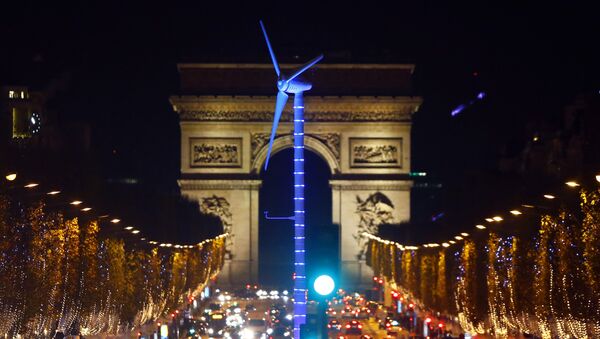The Paris Climate Change Conference, running November 30 — December 11, is expected to result in the signing of a global agreement on the measures necessary to prevent global warming from exceeding 1.5 degrees Celsius, as an increase of average global temperatures of 2 degrees or more has been scientifically proven to have disastrous consequences for the planet.
"Ministers have clearly made huge progress in the last few days, but there are still issues to be resolved, including on the long-term goal that is ultimately needed to solve climate change," Germana Canzi, Senior International Analyst at the Energy and Climate Intelligence Unit, said in a statement Wednesday.
No Consensus
First and foremost, a 29-page text that still lacks 14 pages, contains no consensus on the target temperature — the parties have not yet decided on their pledge and suggest holding the increase in the global average temperature either "below 2 °C above pre-industrial levels", "well below 2°C above pre-industrial levels" or "below 1.5°C above pre-industrial levels."
"We have now a document which shows some significant progress in terms of finding agreement on some significant issues, but there are many big issues open and we will have to see how this plays out," Sven Harmeling, Climate Change Advocacy Coordinator, with CARE International said at the Paris conference.
Kaisa Kosonen from Greenpeace Nordic stressed that keeping the 1.5 degrees target in the text was already a good sign, but the article 3 of the text now lacks the clear message on cutting emissions to zero, which is a prerequisite for keeping temperatures low.
"In the article 3 we had there before a clear message on zero greenhouse gas emissions by 2060 to 2080, which is in line with this 1.5 target, which, by the way, means zero carbon emissions by 2050. Now this option is not as clearly there anymore," Kosonen said during COP21.
She added that the final deal should stipulate the 1.5 degrees target translated into emissions phase out, in particular cargo emissions phase out.
Three Days to Force the Worst Staff Out
Other important options in the text also include the issue of loss and damage, as well as a climate change displacement coordination facility, Harmeling said.
"Some of the words in this text are smeared with the fingerprints of the oil-producing states. It’s a mix of the good, the bad and the ugly, but we’ve got three days to force the worst stuff out and get a decent deal. It’s crunch-time now, it’s going be hard, but there’s a lot still to fight for," the Greenpeace Nordic employee argued.
She added that the current emission pledges of participating states were weak and the draft deal did not mention their improvement or introduced a tight deadline of reducing carbon emissions by 2050.
As for the disuse of finance, there also appears to be a lot of work to do, with the number of brackets increasing the wordings. However, the draft provides for giving grants rather than loans to those states that are in need of adaptation support.
On Tuesday, Bangladeshi delegation stressed that tech developed states should give grants, as they are responsible for the climate change, while Bangladesh for instance, has almost zero emissions.
"Some brackets remain around the issues of who is supposed to receive support in the future… But there is some useful agreement and I think it can really move forward," the Climate Change Advocacy coordinator said.
Harmeling also noted that on the issues of adaptation, the text reflects "some of the most intensive discussions of the last days and is almost without brackets."
The COP21 participating states are expected to reach the final agreement to address global warming and cut carbon emissions, introducing a legally binding and universal strategy on the issue, which is due to replace the 1997 Kyoto Protocol on Friday.



